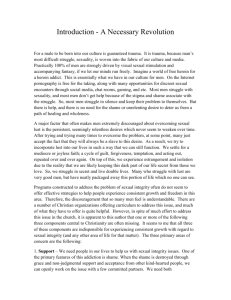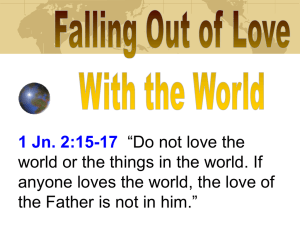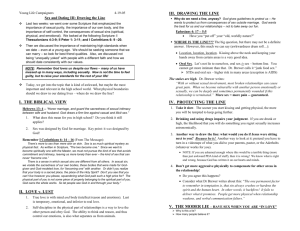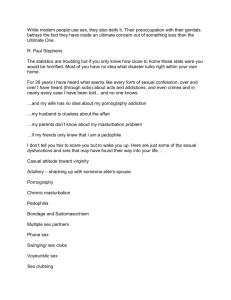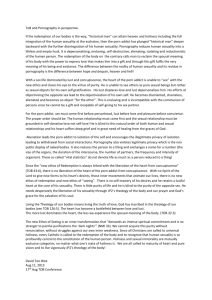"Sin and Virtue" - Pt.8
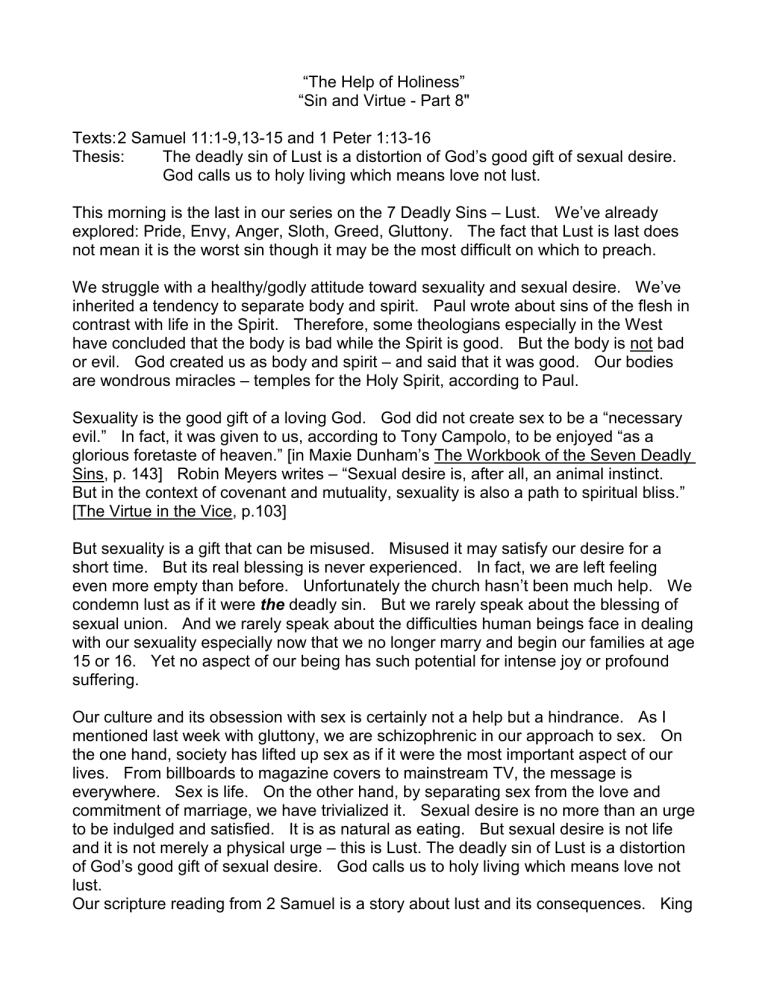
“The Help of Holiness”
“Sin and Virtue - Part 8"
Texts: 2 Samuel 11:1-9,13-15 and 1 Peter 1:13-16
Thesis: The deadly sin of Lust is a distortion of God ’s good gift of sexual desire.
God calls us to holy living which means love not lust.
This morning is the last in our series on the 7 Deadly Sins – Lust. We’ve already explored: Pride, Envy, Anger, Sloth, Greed, Gluttony. The fact that Lust is last does not mean it is the worst sin though it may be the most difficult on which to preach.
We struggle with a healthy/godly attitude toward sexuality and sexual desire. We ’ve inherited a tendency to separate body and spirit. Paul wrote about sins of the flesh in contrast with life in the Spirit. Therefore, some theologians especially in the West have concluded that the body is bad while the Spirit is good. But the body is not bad or evil. God created us as body and spirit – and said that it was good. Our bodies are wondrous miracles – temples for the Holy Spirit, according to Paul.
Sexuality is the good gift of a loving God. God did not create sex to be a “necessary evil.
” In fact, it was given to us, according to Tony Campolo, to be enjoyed “as a glorious foretaste of heaven.
” [in Maxie Dunham’s The Workbook of the Seven Deadly
Sins, p. 143] Robin Meyers writes – “Sexual desire is, after all, an animal instinct.
But in the context of covenant and mutuality, sexuality is also a path to spiritual bliss.
”
[The Virtue in the Vice, p.103]
But sexuality is a gift that can be misused. Misused it may satisfy our desire for a short time. But its real blessing is never experienced. In fact, we are left feeling even more empty than before. Unfortunately the church hasn ’t been much help. We condemn lust as if it were the deadly sin. But we rarely speak about the blessing of sexual union. And we rarely speak about the difficulties human beings face in dealing with our sexuality especially now that we no longer marry and begin our families at age
15 or 16. Yet no aspect of our being has such potential for intense joy or profound suffering.
Our culture and its obsession with sex is certainly not a help but a hindrance. As I mentioned last week with gluttony, we are schizophrenic in our approach to sex. On the one hand, society has lifted up sex as if it were the most important aspect of our lives. From billboards to magazine covers to mainstream TV, the message is everywhere. Sex is life. On the other hand, by separating sex from the love and commitment of marriage, we have trivialized it. Sexual desire is no more than an urge to be indulged and satisfied. It is as natural as eating. But sexual desire is not life and it is not merely a physical urge – this is Lust. The deadly sin of Lust is a distortion of God ’s good gift of sexual desire. God calls us to holy living which means love not lust.
Our scripture reading from 2 Samuel is a story about lust and its consequences. King
David is restless – walking about the roof of his palace. He spots Bathsheba bathing.
She is beautiful and he lusts after her. Even when he discovers that she is married, he sends for her and has sex with her. No thought about morality. No thought about the consequences. He desired her – he took her. And she became pregnant.
David compounds his sin by trying to cover it up. He sends for Bathsheba ’s husband
Uriah thinking that if they have sex everyone will think the baby is Uriah ’s. But that doesn ’t work. David increases his guilt by sending Uriah into the worst part of the battle where he is sure to be killed. Lust leads to lying and even to murder. The consequences of David ’s sin are profound. His family life will forever be conflicted.
And the seeds are laid for the division of the nation of Israel.
Lust is defined as intense sexual desire – uncontrolled or illicit sexual desire – a passionate or excessive desire or craving. It ’s no wonder that lust cannot consider the morality or consequences of its behavior. We say that we lust after a person.
Lust turns a person into an object – the object of our desire. Henry Fairlie writes –
“Lust is not interested in its partners, but only in the gratification of its own craving– not in the satisfaction of our whole natures, but only in the appeasement of an appetite that we are unable to subdue...Lust accepts any partner for a momentary service.
”
[The Seven Deadly Sins Today, p. 175]
The deadly sin of Lust is the unrestrained and unethical expression of the sexual impulse. It is a destroyer of worlds – whether through divorce, or child abuse by the clergy, or simply the lost opportunities of a teenage parent. Lust betrays every good thing – especially trust.
The contrast to Lust is Love. Lust arises from our deepest desire for love. Stephen
Shoemaker writes – “Persons trapped in sexual sin are trying so hard to love and be loved. Lust is especially poignant; it is the distortion of the highest good and purpose of life: love. It is so close to love and yet even in its closeness so painfully far away.
”
[Dunham, p. 140] Love requires involvement – but lust refuses to get involved. Love requires commitment – but lust runs from commitment. Love treats people as persons – but lust treats people as things. Maxie Dunham writes – “A biblical theology of sexuality asserts that the full meaning and joy of sex can only be experienced in the context of loving commitment.
” [p.146] Someone once said that when bodies lie together they make an unspoken promise to one another. Either that promise is real or it ’s a lie. If it’s real, there must be commitment. If it’s a lie, someone will get hurt and trust will be destroyed. That broken trust will make future relationships difficult.
So, let ’s look at the effects of Lust in our lives. First, promiscuity or what some call
“casual sex.” It’s a reflection of the shallowness in relationships. “Casual sex” is actually a contradiction in terms. It implies that one can be physically intimate without being emotionally involved. But if we are whole beings – body and soul – this is impossible. Or if it is, then someone is being used. As we ’ve said, love does make demands. Promiscuity means that many people are no longer willing to meet those
demands. When an individual has sex with someone he or she does not care about, and has no intention of ever caring about – that is tragic. God wants more for us than
“casual sex.”
No Strings Attached is a movie about two people who are attracted to each other.
They decide to have a sexual relationship but with “no strings attached.” He’s never believed much in commitment. And she ’s dedicated to her career as a doctor and not interested in a relationship. But he falls in love and wants more. Initially she resists but in a typical Hollywood “happy ending” finally realizes that she loves him as well.
The problem I have with this movie is the fantasy that we can have sex with anyone and everyone until we meet the “right person.” Then, somehow, we’ll live happily ever after. Promiscuity makes it less likely that a person will find physical, emotional, and spiritual satisfaction with one person. God wants more for us than “casual sex.”
Second, a less flagrant example of Lust is the number of couples living together before marriage. I wish it were otherwise, but I have to admit that of all the first time marriages I ’ve performed, only five were not living together and only one was not already involved sexually. In most cases, I ’m told, it was a practical matter – the commitment of marriage was already there when they moved in together. For some, however, they chose to live together first to make sure the relationship worked. And many will never get around to marriage. But the truth is that more couples who live together first will divorce than those who do not. Because there is a way out, this is not a true commitment. As Dunham says – “We like to think that love is the necessary ingredient for marriage, but it is the other way around. Marriage is a necessary ingredient for lasting love.
” [p.147] Only when you promise “till death do you part, ” do you commit to the work of love which brings the blessing of “two becoming one flesh.
”
The third instance of Lust is infidelity or adultery. A third grade Sunday School teacher was teaching about the 10 commandments. When they got to the 7 th commandment, she asked – “Would someone please explain what adultery means?”
One child said wisely – “Adultery is when a kid lies about his age.” [Humor for
Preaching and Teaching, p.8] Although this commandment has more jokes made about it, adultery is no laughing matter. Half of all marriages fail, and adultery is a primary cause of those failures. Sexual infidelity takes the attention and energy which belongs to our partner, and gives it to someone else. Because sexual intimacy involves our whole selves, it ’s like we’re removing a part of ourselves and giving it elsewhere. Trust will be damaged by just one affair – and that trust takes a long time to recover. Repeated infidelity erodes a relationship until it may not be possible to heal.
It ’s interesting, Jesus once said – “You have heard that it was said, ‘You shall not commit adultery.
’ But I say to you that everyone who looks at a woman with lust has already committed adultery with her in his heart.
” (Mt. 5:27-28) This sounds pretty harsh. But I don ’t believe Jesus was talking about the natural rush of sexual energy
that happens when we see an attractive man or woman. The question is what we do with that feeling. Do we begin to fantasize about that person? Do we turn them into the object of our desire? That ’s lust. And Jesus warns that it’s a slippery slope from lust to adultery. Lust is so destructive that Jesus said it would be better to poke out your eye or cut off your hand if they contribute to your lust. God commands fidelity in the covenant of marriage as the only way to the safety and trust which brings loving and joyful sex – “good sex.”
The fourth effect of Lust is pornography. Pornography is the ultimate in sexual expression with an object rather than a person. The proliferation of sex in advertising and the media – music, TV, videos, movies – is a mild form of pornography. It is meant to excite us. We can and usually do indulge in pornography by ourselves. It is a substitute for involvement with another person. Like other forms of Lust it tends to be progressive. As our senses atrophy, it takes more extreme experiences to satisfy us. What begins as a subscription to Playboy or Playgirl may evolve to mail order “toys” or internet porn or phone sex or even visits to a strip club. This is not the appropriate use of God ’s good gift of sexuality.
Finally, there are a number of effects of Lust which are more distorted and destructive.
Rape especially date rape is on the rise. Incest – Prostitution – Pedophilia. These acts are not only immoral, they are criminal. Needless to say, they fall outside God ’s plan for human sexuality.
We are called to glorify God in our bodies. Paul writes to the Corinthians – “Or do you not know that your body is a temple of the Holy Spirit within you, which you have from
God, and that you are not your own? For you were bought with a price; Therefore glorify God in your body.
” (6:19-20) Peter put it this way in our second scripture reading – Don’t be conformed to your old desires. Be holy in all that you do.
Now, don ’t imagine that holiness means an absence of sexual desire or delight.
Listen to these words from the Song of Songs or Song of Solomon, Ch 7 beginning with the 1 st verse – “How graceful are your feet in sandals, O queenly maiden! Your rounded thighs are like jewels, the work of a master hand. Your navel is a rounded bowl that never lacks mixed wine. Your belly is a heap of wheat, encircled with lilies.
Your two breasts are like two fawns, twins of a gazelle. Your neck is like an ivory tower. Your eyes are pools in Heshbon, by the gate of Bath-rabbim...How fair and pleasant you are, O loved one, delectable maiden! You are stately as a palm tree, and your breasts are its clusters. I say I will climb the palm tree and lay hold of its branches...
”
Wow! This book is definitely PG-13 if not R. Holiness is not the suppression of sexuality but the appropriate expression of sexuality. And the full expression is reserved for the commitment found in the covenant of marriage. Meyers calls this
“holy eros.” Holy Eros is a gift from God. Holy Eros allows lovers to trust and therefore, give themselves completely to one another. Holy Eros discovers that the
greatest turn-on is empathy – the most effective foreplay is thoughtfulness – the greatest gift is to truly know one another. Holy Eros is a way of life.
The Deadly Sin of Lust is a distortion of God ’s good gift of sexual desire. It is not the worst of sins. And like all the Deadly Sins, the hope for new life is in Jesus Christ.
You have probably recognized yourselves somewhere in the description of these 7 deadly sins. We are all sinners who fall short of God ’s glory. But as we recognize our sin – as we confess our sin to God – as we receive God’s forgiveness – and as we open ourselves to the working of the HS – we will be changed. That is what Lent is all about – the recognition of our need for a Savior to set us free.
As we come to the Lord ’s Table on Maundy Thursday – hear in a very personal way –
This is my body broken for you. This is my blood shed for you for the forgiveness of your sins. On Good Friday, know that your forgiveness was bought for a price – the price of Christ ’s suffering and death. Then, may you experience the hope and freedom and joy of Easter morning. Amen


